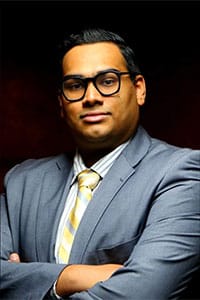Ask anyone participating in a cultural exchange: It’s helpful to know the local language.
Morgridge Postdoctoral Fellow Amritava Das knows this well, and not just because he speaks five languages. His career has been defined by bridging the different languages of science and ethics, and he will soon be taking that expertise to the U.S. Department of the Treasury via a prestigious Science & Technology Policy Fellowship from the American Association for the Advancement of Science (AAAS).

Das will be the first ever AAAS Fellow accepted into a position at the Department of the Treasury. He will be working with the Committee on Foreign Investment in the United States (CFIUS). The committee, which is composed of 9 cabinet officers plus several White House officials, reviews financial transactions involving foreign investments in the U.S. CFIUS’s role is to determine those investment’s impacts on national security.
Das anticipates that he will put his engineering and bioscience training to use exploring the sometimes knotty connections between science, national security, and finance.
And he is well suited for exploring those knotty questions. Since his time as a graduate student in Chemical and Biological Engineering at UW–Madison, Das has explored projects at the intersection of bench science and interesting questions outside the laboratory.
As a Morgridge Postdoctoral Fellow, Das’s work explored the relationship between bioethics and biomedical engineering in relation to patient care.
His project, which supports UW–Madison’s participation in the Research Center for Cell Manufacturing Technologies (CMaT), examined production of new CAR-T cells for treating cancer.
Each batch of CAR-T cells are custom-made for patients, and some cell types are quite tricky to produce. When deciding what types of therapies to produce, facilities must sometimes choose whether to prioritize production for patients most likely to benefit from the cells or to prioritize production of CAR-T cell treatments that are most likely to have a successful manufacturing run.
Das’s work has focused on producing models to predict overall outcomes depending on what production strategies are used.
Das was advised by Krishanu Saha, associate professor of biomedical engineering at the Wisconsin Institute for Discovery; Dr. Cristian Capitini associate professor of pediatrics at UW–Madison School of Medicine and Public Health; and Pilar Ossorio, Morgridge Institute Bioethicist in Residence.
Saha says that Das’s fluency in both biotechnology and bioethics has been invaluable and will inform how UW–Madison moves forward with cell therapy production.
“Early stage development always involves academia, and Tava’s work lets us have a better conversation about how we build our capacity for manufacturing,” says Saha.
The Morgridge Postdoctoral Fellowship Program encourages collaboration between investigators at Morgridge and UW–Madison, while attracting trainees seeking to diversify their skills.
“This collaboration wouldn’t have been possible without support from the Morgridge Institute,” says Saha. “It allowed us to hire Tava as a postdoc who could explore this project at a high level.”
Das says that career path decisions come down to a simple question: “Is this going to be an interesting next step, or is it just another job?” That’s why he chose the yearlong, grueling selection process for an AAAS Science and Technology Policy Fellowship.
The AAAS program places engineers and scientists throughout the federal government, where they work at the intersection of science and policy. These highly competitive awards allow Fellows to contribute their scientific expertise to tackle important societal issues through government policymaking.
Anticipating the next stage in his career, Das says he’s excited about getting an insider’s view of the federal government and working in a role so closely connected to many cabinet departments (literally…his office building is adjacent to the White House complex). And while he’s eager for the move to D.C., he’ll also take fond memories of Madison with him, “Madison is pretty awesome. I could be here forever!”
